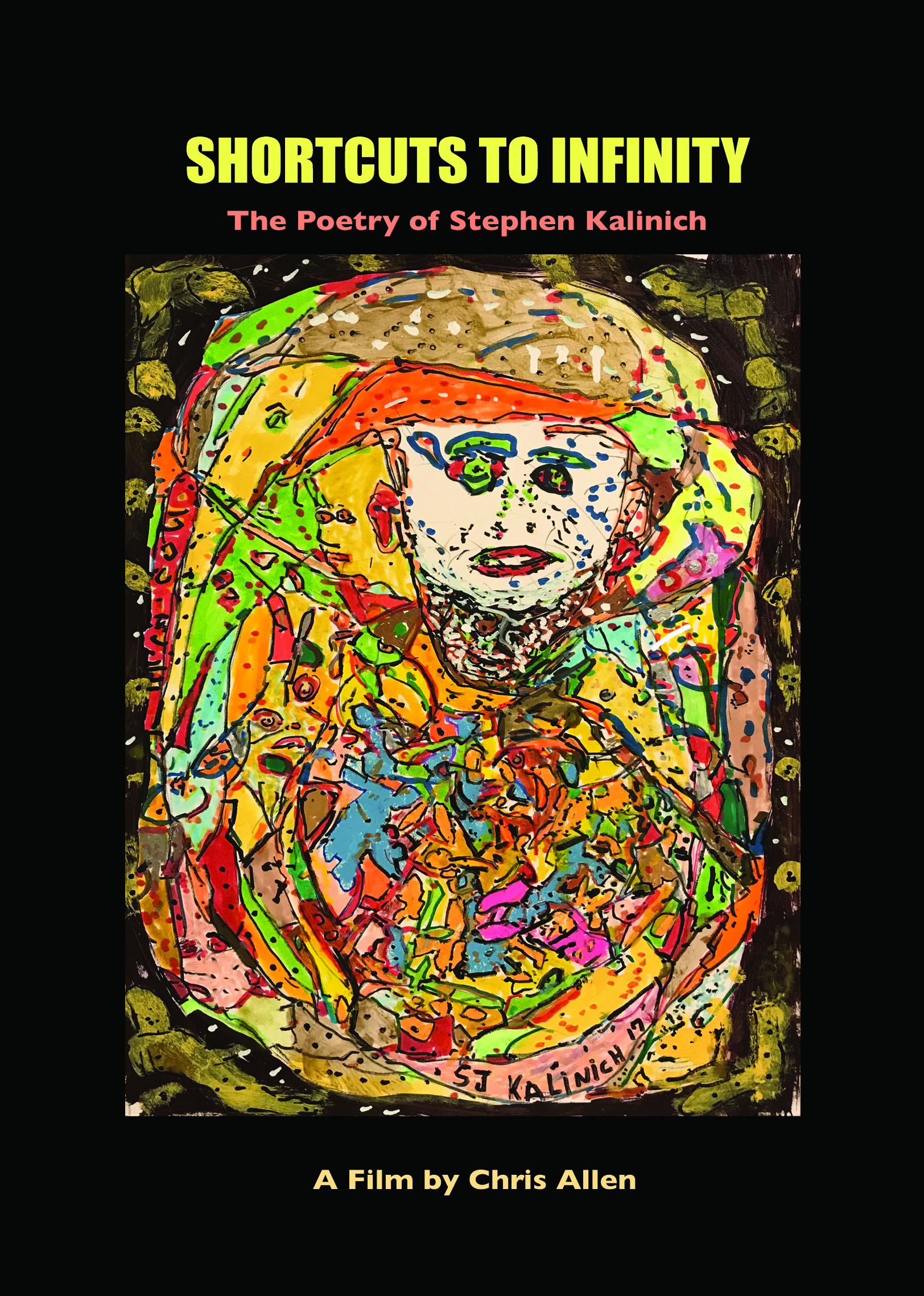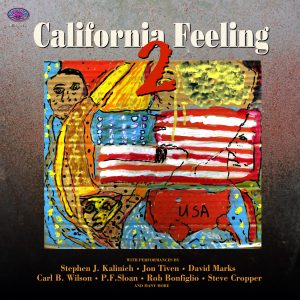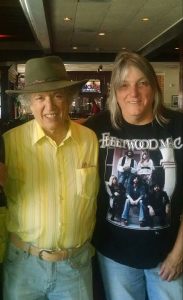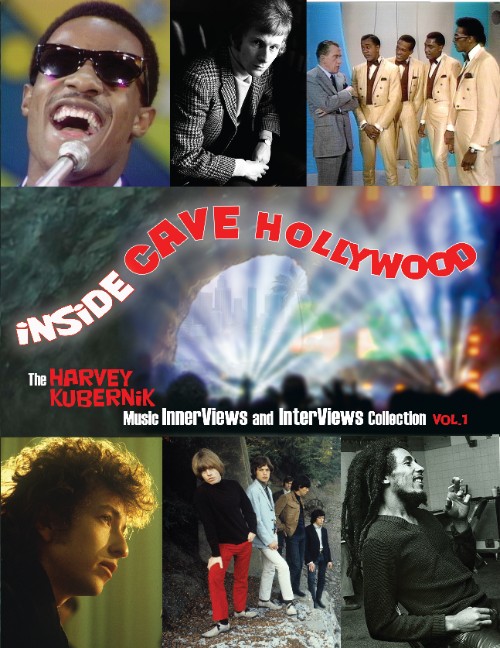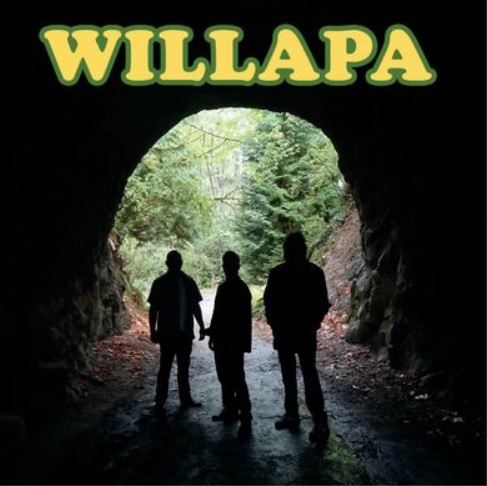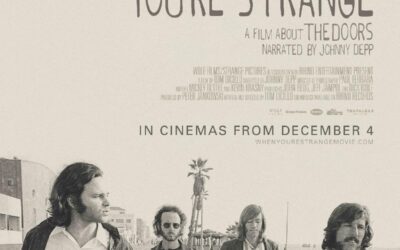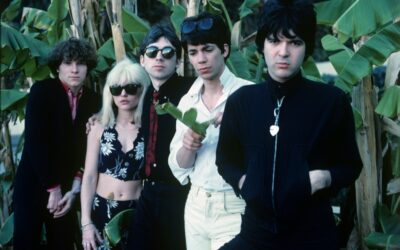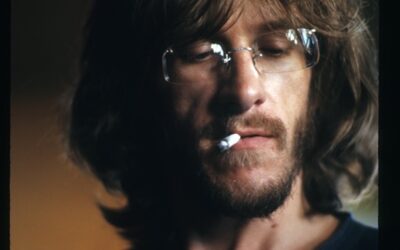By Harvey Kubernik c 2017
Poet/lyricist/songwriter and performer Stephen J. Kalinich, no stranger to Cave Hollywood viewers, a few years ago portal owner David Kessel 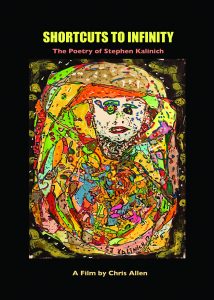 interviewed Kalinich when he released his two California Feeling albums on the MsMusic record label.
interviewed Kalinich when he released his two California Feeling albums on the MsMusic record label.
In late 2017, director Chris Allen and Chris Allen Films released a feature length 81 minute documentary Shortcuts to Infinity-The Poetry of Stephen Kalinich.
Executive producers are Don Fertman, Chris Allen and Carol Schofield.
The movie incorporates interviews with Beach Boys’ Brian Wilson, Al Jardine, and David Marks as well as PF Sloan, Jon Tiven, Alan Boyd, Paul Steel, Carl B Wilson, Dan Knutson, and Ralph Stevens. Also appearing in the film are Carnie and Wendy Wilson, Carol Schofield, Marla Maples, Bill Duke, Marilyn Wilson, Richard Lawson, and many others.
Stevie’s painting and stand-up act are explored, as well as a look at the play based on his book
From The Heart of Love. The DVD can be ordered at www.chrisallenfilms.com.
I recently spoke with feature subject Kalinich, director Allen and MsMusic label owner Schofield.
Harvey Kubernik: What drew you to do a film on SJK?
Chris Allen: I was doing an interview with Alan Boyd for another project related to the Beach Boys, and saw a copy of If You Knew by Stephen Kalinich on his table – a book of poetry. I was familiar with Stevie’s name from his writing work on the Beach Boys’ Friends album, but had never heard about him since, so I was intrigued when I saw the book. Alan said he was friends with Stevie and got him on the phone. We talked for a few minutes and he agreed to do an interview with me. After that, we kept in touch, and at some point I asked him if he’d be willing to let me do a film on him. He was game, and I started the ball rolling.
HK: Were his songwriting and poems and recordings the initial factor?
CA: I loved the two songs on the Friends album – “Little Bird” and “Be Still” – and that was all I knew about him. The songs were more philosophical and spiritual which attracted me. When we talked, I was drawn to his personality and enthusiasm, his positive energy, which I discovered during the course of our first interview, which was for a print piece. I felt comfortable talking to him and we hit it off. I think we have a similar view of the world. It was really refreshing to find someone who maintained a kind of “hippie” vibe into the new millennium, he was still idealistic without being naive, and I related to him like a long lost friend. A couple people that I interviewed for the film compared him to John Lennon, which I get. He preaches peace and love, but has a great sense of humor and truly cares about people and the world.
HK: How did the production and directorial process work in constructing the film?
CA: First of all, this film had no budget. When I started it, I funded it myself, drove from the east coast to California with my son James, and we shot the first round of interviews. Typically I would ask the questions and James was on camera. I made about 5 or 6 trips out to L.A. over the years (often alone, serving as lighting director, camera operator and interviewer), cashing in some mileage points from my time in corporate work, and just charging everything. I had a cousin in L.A. who put me up and I just kept going on faith.
About halfway through, Stevie introduced me to Don Fertman who began to finance my travel budget, and helped with some other expenses. I knew that when the film was cut, we’d have to deal with music royalties and I had no idea what the cost would be. My first cut had a few versions of “Little Bird”, for instance, and when I got the price from the Beach Boys publishing, it was way out of my reach. We tried to find people to back us and put up the money for the rights, but no one bought in, so the song, along with “Be Still” and “California Feeling” had to be cut. There were several versions of “Little Bird” – Stevie singing it in the studio, Carnie and Wendy Wilson’s version, as well as The Beach Boys.
At first it hurt to have to cut them, but I felt the other songs in the film were so strong that it would be fine. If anybody has heard anything by Stevie, it’s those Beach Boys songs, so in a way it’s good that the film focuses on his work with other artists. I love the music in the film, and believe that Stevie brings out the best in the musicians he works with. Brian Wilson was kind enough to give us permission to use “A Friend Like You” for no charge, and many of the writers were willing to grant us gratis use. There was also a song he wrote for Mary Wilson, which we couldn’t get the rights to, and had to be cut. Her interview is included in the Extras on the DVD.
The thing about doing this film is that every time I thought I was done, Stevie would be onto another project and I’d go back and do another round of interviews to include it. That happened with his trip to England, where he wrote with Paul Steel and Peter Lacey, and did a whole bunch of spoken word performances with guitarist Richard Durrant. It happened when he and David Marks wrote an album together, then again with Jon Tiven who has written over a thousand songs with Stevie, and on and on.
When I was finally ready to say it was done, Stevie had gotten into painting in a big way and I wanted to include something about that, but finally decided I had to stop. He’s the most prolific artist I’ve ever met.
Carol Schofield of MsMusic Productions gave a generous donation and we were able to finish the project and print DVDs through people contributing to a Kickstarter, which I’m very grateful for.
HK: Did Stevie suggest people to lens?
CA: Some of the people I interviewed were people Stevie suggested, such as Phil Sloan, Bill Duke, Billy Bentley, Feline Kondula and a bunch of others. Everyone I approached was willing to do the film because of their love for Stevie. They didn’t all make it into the final edit, as we had enough footage for a mini-series! But they all loved Stevie in a real way, and I was discovering through the interviews that his love of people was real, and it ranged from famous rock stars to car mechanics and waitresses. He really doesn’t differentiate based on your fame, wealth, beauty, etc. He has a pure sense of love for all people, and unless you’re just a total asshole, he will embrace you.
HK: Did you have a general outline?
CA: Not really. I knew I wanted to interview people he wrote with – Phil Sloan, Brian Wilson, David Marks, Jon Tiven, Alan Boyd, Ralph Stevens, Dan Knutson, Paul Steel, Carl B. Wilson, Peter Lacey. And others… many of whom we didn’t get to. Stevie had written a book of poetry called From The Heart of Love which was turned into a play – sort of a living poem – and I wanted to include that, so I interviewed the principals responsible for making that happen – Feline Kondula, Richard Lawson and Maria Del Bagno. He also wrote songs for an animation project called The Ooglebees, which Rupert Hitzig was trying to get produced. That got cut in the end, as it was never realized, though about 10 or 15 songs were recorded and the characters and storyline were all developed.
His poetry album – A World of Peace Must Come – came out during filming so we added a piece on that with Bill Bentley and Matt Sullivan. Like I said, so many projects kept coming up during the whole process and I tried to get as much of it in as possible. He began painting words on John Robertson’s canvases at some point and we did a piece on that, which is great. It opened up a whole new world of expression for Stevie, and his painting has become another amazing reflection of his vision of the world.
HK: What were your initial thoughts about SJK as an artist and after editing the movie what do you think you further learned about him?
CA: I became truly inspired by Stephen Kalinich through working on this film. I think it accurately represents him – as Carl Wilson said, he doesn’t have a front, what you see is what you get. His work ethic, pureness of spirit, kindness, and his desire to make the world a better place have certainly rubbed off on me.
I couldn’t have had a better project to spend a few years on, and I know it’s made me a better person. He has that effect on anyone who’s not cynical. He’s a unique person of grace in a world that generally doesn’t care. And he doesn’t complain. The man has no money, has bad health, gets little respect, and responds by giving his love and being thankful for being alive. I’m grateful to have met him.
HK: What is your background in film?
CA: I began shooting film in 1966 on a crank wind 8mm Kodak camera, my first film being an interpretation of Rick Griffin’s comic strip character “Murphy.” Once I started making films, I never had any other ambition. I went to NYU film school and worked on some network movies and then for many years in corporate TV.
I met Walter Cronkite who narrated a film I produced on Vaclav Havel which won the Gold Medal at the New York Festivals. I made another feature documentary called Quark Park about a group of artists, scientists, builders and landscapers who turned an unsightly vacant lot into a public space of wonder, a temporary installation that transformed a town and brought people together in a magical way. Along with Dave Beard, I produced a series of videos about musicians including Dean Torrence, Van Dyke Parks, Tony Asher, Darian Sahanaja and Nicky Wonder, Alan Boyd, Billy Hinsche and Bobby Figueroa. I’ve sung in the group The Spinxmen, was a lifelong surfer, and edited the zines Osk Jounal and Open Sky.
My proudest achievement is being the father of three magnificent children. My wife, Sue, is rock of my life.
Harvey Kubernik: Stephen, why in the world did you get involved in this filmic endeavor?
Stephen J. Kalinich: Chris came to me and asked if he could make a film. I liked him a lot. He had a magazine called Open Sky which had a lot about the Beach Boys .That was a favorite magazine of mine. He was a nice guy and the articles were great. He was open to many dimensions of life and ideas.
HK: Did you want to build a big body of work over a half decade and then feel comfortable to let a director/producer into your life?
SJK: I am not sure. I did want people to be aware of my work but i was and am more interested in being a force for peace and good in the world. I love to inspire people and wanted people to live in peace I was very strong anti-war anti-killing.
HK: I suspect you provided some names and contact info initially and then things developed. Right?
SJK: I set up some contacts and names of friends to him and he knew a few himself. Alan Boyd was aware of him and first made me are of him. That is what I remember.
HK: What was it like working with Chris Allen?
SJK: It was easy he was wonderful and we had a lot of fun. I think he put up with a lot from me. I did not know any of the legal part about copyrights or anything. So at times it was tough for him. But he stayed true and saw my heart and intent. Other friends wanted to blame me but not Chris.
HK: You’ve been filmed before on interviews and some footage that is on the web. Is it difficult to actually discuss poetry on film?
SJK: I think it’s a great way to express poetry on film. It adds dimension color depth vision .
You not only hear the poem you see how it is expressed you feel the emotional impact and some poems are better when spoken than read. You create as you go in answering questions as if writing an oral chorus or verse about your poems and sometimes the descriptions can fall into the poetic.
HK: Is it hard to discuss or describe painting and intent on film?
SJK: I also love painting and talking about art on film getting into the whole concept of art is it just you? Is its gift? Is it from God the divine? Is it human? Is it a way to heal a way to touch other beings on multiple levels?
HK: Can you actually talk about songwriting in a movie?
SJK: There a different ways to write in a movie. One is they pick a song you already wrote for a theme or a movie .Another way is they ask you to write a song for a specific theme or mood and then you have to get the approval. This way is tougher because they may not like what you do even though it sounds great and it’s a film so you go with what they decide .That is tough way.
HK: Your friend Brian Wilson said “a song is never finished.”
SJK: I agree with Brian a song a poem a painting for me is never finished.
The great song or work of art for me leaves an opening in the work that is alive where you could always add more or take away. It’s true in art and painting. It feels good and alive and you are for that time able to leave it but a year later you may see or hear something you want to change in a work of Art.
HK: Of all the areas you traffic in, songwriting, performing, painting and poetry, as well as stage plays, can you compare and contrast them? What comes easier? What is harder?
SJK: Of all the arts I am involved with now I find they are like one soul or tree with many branches they move in and out of each other. They all blend and emote. Right now the painting flows more often than the songs or poems but at 3 am it changes They all feel like gifts. Teachers using different modes of expression. I prefer writing words first in songs but I am not adverse to doing it with music first. Collaboration is difficult. I prefer working alone but I can work with others but the other always has a feeling about how it should be that does not always agree with mine.
HK: You used to write poetry and songs by hand or in a note book. Now you employ a computer. What is the difference in the creative part of the tune or page process going from pencil to screen. Is a computer a factor in editing?
SJK: I like both writing by hand in a computer they activate different parts of the brain. I think hand written and spoken writing into a cassette or a video is my favorite I get a rhythm going I love it. I love being alone creating but I enjoy working with others. I think I am difficult to work with. I find people argue to be right and sometimes it does not make a difference and it’s not worth arguing over but I realize everyone works their own way. It takes humility to listen to another and in your gut you feel you are right you must express this. There is no one approach each creative task or work demands a unique response
HK: Is your painting influenced by computer?
SJK: My painting is not influenced by computer. In fact one thing we have too much computer in our lives. Too much social media to many texts and phones. It’s a form of insanity beyond a certain amount of activity. People need to talk more communicate more. Listen to each other not just talk.
HK: There are some people in this documentary that you have 50 year friendships with. What is the secret of staying in contact or always being in the loop with the likes of Marilyn Wilson, Ginger Blake, for example. And then the Wilson children like Carnie and Wendy?
SJK: I love the people I stay in contact with. I love Marilyn Wilson and Carnie Wendy Brian Daniel. I love Ginger and Jimi and many of their friends and kids
The key in staying in touch is seeing each other when you can little acts of kindness and caring throughout the years. Always taking time no matter how busy I am to respond as best I can when they want to talk to me. We choose. If people do not respond to you after awhile let it go without bitterness or resentment. Do not try and force people to be your friends. Many people cater to celebrities to me I do not like that. I love the people in my life at the cleaners, my bakery, mechanics, the shoe repair people in the markets. I try to keep an open heart. We are all just humans and you sense someone is off kilter, do not engage.
HK: What do we need to know about Brian Wilson from your point of view?
SJK: Brian is a human being with great soul who has a gift and touches many lives and he struggles with the same things as all souls do. As a friend he has helped me as much as anyone when it was not commercial for him he stood by me with the poetry. He is kind and compassionate to me even through all of his own struggles. He is a very good guy and just expresses love t. He has given a lot but the same with Dennis. Just human beings that is what we all are. What I say about others I would say about myself. We all have wounds we all have issues to work out we all have moments of triumph and Brian has had many but it’s not easy for him in my opinion he is amazing to still be involved and active and the same love flows through him that he expressed in his early twenties when we first met.
HK: And, how about a story or tale of hanging or eating with Brian.
SJK: One time when I got my eye surgery a few years back 10 or so maybe less .Brian took me there and picked me up after the surgery and drove himself. We ate out hundreds of times maybe more and we always had fun. We would sit in the booth and make phone calls all around the world. One time Daniel, Marilyn Wilson’s new husband, met us for a strawberry Milkshake at Mel’s on Ventura. So many stories. We went to Santa Monica Pier with Delanie and Daria and rode the Ferris Wheel.
HK: On the Beach Boys’ 50th reunion tour they performed “Little Bird,” a song you wrote with Dennis Wilson.
SJK: Yes David Marks sang it. It was a thrill. I loved writing “Little Bird” with Dennis and Brian helped on the bridge.
HK: Give me a line or two on the other Beach Boys you know and have worked with. David Marks, Al Jardine, Mike Love, Carol Wilson.
SJK: David Marks is a wonderful talented song writer and of course guitar player .He is good buddy. I love his wife Carrie .Another underrated member of this group. I love writing and creating with him.
Al Jardine has been blessing to me. In the sixties is was booked to go in the Maharishi tour and Al was the first one to talk to George Harrison about me.I was supposed to be on that trip to UK . Al has recorded some of my songs on Postcard from California and produced the poem of mine that Alec Baldwin narrated “Tidepool Interlude.” He also let me open for him at the Henry Miller Library in Big Sur. One of the great gigs in my life,
Mike Love and I have been friends for 50 years and we joke around with each other a lot. I love Jacquie and his kids. He has always been kind to me when I first signed. He took me to his house lent m this car. Came up with a joke concept Rent A Poet.
Carl Wilson produced by first single “Leaves Of Grass” in studio B Capitol Records. A sweet guy and taught me how to sing. Which I do not do much these days. He taught me many valuable lessons about voice.
Bruce Johnson and I love each other. I did not have as much interaction but I love him and think he is a very gifted song writer.
HK: I’ve always liked Bill Duke, a good friend of yours. One terrific actor, writer and producer/director. He’s so telegenic on screen. Tell me how you guys hooked up. Bill and I share the same February 26th birthday. What was that funny line you told me about how you and him are so different in the negotiating game.
SJK: Bill Duke is a great actor director poet a funny guy too. We started going out to eat a lot and did poetry shows together. He is a close friend a great talent. Once you see him on the screen you can’t forget. He said to me when we met he said we are good team you are willing to give away everything and I will give nothing in a deal. I always thought that was fun. He gives a lot as a friend and he is good poet.
HK: You have some recordings, CD’s and vinyl albums with Carol Schofield and MsMusic. What would you like to say about working with her and the relationship you have with her and the label?
SJK: Carol and I get a long great. She is willing to get behind you if she believes in you.
She has been open and receptive to new ideas and concepts. I would like to thank Mark Linnett for introducing me to her. She has been very supportive I love her. I love the Yo MaMa records she put out. Andrew Loog Oldham is a supporter of Yo MaMa. I also love the records she put out California Feeling 1 and 2 and all the other vinyl and CD s she has released. She has a good caring heart. I was happy to bring her PF Sloan and she released his last record My Beethoven which is a great record and they became friends.
HK: I would be remiss if I didn’t ask you about the late PF Sloan.
SJK: PF is one of my dearest and sweetest friends. With a great soul and heart. I miss him every day. I could go on and on about PF. To me he is one pf the greatest song writers ever.
Versatile, inspired, talented with a real concern for the planet and people. I feel there is an element of grace in all of this as if the divine is at play. PF wanted to touch the world he certainly deeply touched mine as much as anyone ever did.
HK: You mentioned to me a while ago that at age 76 you are seeing some of your peer group physically leave the planet. Do you become a messenger for them?
SJK: I do not know if I am messenger but as my friends leave the planet. I am so grateful I got to experience their friendship art and soul. My life is blessed because of them. I want to do good in the world and inspire others and be a force for peace as best I can. At the same time recognizing that I am a flawed being.
HK: Now that the movie is out, what is your initial feeling when you started and what is your reaction to seeing the finished work?
SJK: Chris Allen did a wonderful job. I like what he did because I am still in progress everyday doing new things creating new avenues of communicating and touching others. I had no plan I just let it unfold. I am grateful to everyone involved. The extras show some of it. He had to leave out a lot that was his decision.
HK: Do we get a real portrait of you?
SJK: The portrait of me in the movie is pretty accurate. I guess you feel my dark side, too.
It’s hard to be objective. I love Chris Allen’s dedication and sticking with me through times when I imagine I was not easy to deal with and staying true to me.
HK: Talk to me about The Heart of Love
SJK: Heart Of Love thanks to Feline Kondula Butcher was a great experience in my life. She put her heart and soul and money into a work that was about love and she was the key and catalyst .She is a love I adore her. She believed in me when no-one else did. I think it is great project in my life. Richard Lawson brought his heart and soul into this and helped it to become larger in scope and helped create a master piece out of our book which we were all engaged in. I was not well when we did it and had heart surgery but all these years later I feel it was wonderful that Heart of Love was created.
Maria Del Bagno choreographed and created dance moves and made a grand contribution and brought in so many good people and layers .Everyone involved was incredible .I myself prefer the first version raw and unedited when it was just alive and new. It was an inspiring time and project that still has great potential. As a poem it follows my work in the sixties on A World Of Peace Must Come with Brian Wilson.
HK: In the often pathetic and hateful world that currently exists, why do you still cling to a world of peace and love?
SJK: I still believe in miracles and bring a practical approach to everyday life that embraces the world that is inclusive to all beings. I believe Peace is the only answer if the world is not to blow up. It is rough troubled sea a turbulence of times but there is hope.
HK: How does your Buddhist leanings inform your daily travels and how do we see the results in this movie? You have a tune, an instruction, called “Be Still.”
SJK: Stillness for me came from an early age .Even before I knew of Buddhism or peace teaching my soul wanted peace for all being before I wrote my first song or poem. Be still has enabled me to survive. I still have little money I still struggle and without friends I would be on the street. I am so close to the edge still and people would not believe it. The stillness has guided me through every day. I am alive because of it and I want to bring more stillness into each life .Not just one form of quiet but open to all forms of meditation and stillness. Like voice, drums, walking stillness whatever it is that you can go to the quiet with and release the problems for a few seconds and every day more is a good step in life and practical for survival.
Harvey you are a good soul thank you.
Harvey Kubernik: Carol, how did you first meet Stephen J. Kalinich?
Carol Shofield: I met Stevie between 11-2009 & 1-2010, Mark Linett introduced us at my then record store Foothill Records in La Canada…in the first few months of 2010
HK: What made you sign him to your label?
CS: I listened to samples of the tracks for the proposed release California Feeling. Stevie and I instantly got along and I liked the samples I heard immediately as well….
HK: You’ve always admired his artwork, besides his poetry and songwriting. Talk to me about the three distinct areas of art, music and poetry that are housed in the recordings on your label.
CS: Stevie’s writing is inspirational and uplifting and some in your face life in the raw very universal messages filled with soul, heart and some sarcastic humor pointing to the human condition,
HK: You are involved in the Chris Allen film about Stevie. Some of the talking heads have done some recording collaborations with Stevie now available on your label. But what is it like actually seeing them discuss his work?
SJK: The film title is also the CD title of a release on the MsMusic label Stevie and Jon Tiven did and they created the Yo Mama twosome….Stevie’s poetry on stage has a strong presence, you feel the passion coming from him… Stevie’s documentary that Chris Allen produced is done well with all of people close to Stevie sharing his persona, and love fills the screen of the special person behind all the writings he’s given to the world…
HK: How did you enjoy filmed for the movie?
CS: It was an honor to be asked to appear in the film. And I became aware of how vital an artist he is, and solidified how loved he is and touched by all that know him…
Stevie is a special messenger of love, in his daily interactions as well, I’m thankful to call him friend.
HK: Stevie also steered PF Sloan to to your MsMusic record label. You and Phil had a friendship beyond him being with MsMusic. Tell me about PF Sloan and the album issued on your label.
CS: Stevie introduced me to PF (Phil ) Sloan asking if I’d be interested in releasing My Beethoven. Phil’s masterpiece… I loved it the very 1st afternoon i heard it in Glendale as Stevie and I sat in my truck listening to the demo. I also heard inspiration of John Lennon in “This Love” I later mentioned it to Phil that it had a touch of Imagine feel to it and asked if he had known John and he replied yes… I smiled…
We mutually agreed on the biz points of releasing My Beethoven we flowed from day one.
I did tell him when we first met Eve of Destruction album had always been a fave of mine, along with The Fantastic Baggies Tell them I’m Surfing ” LP.
Phil was a deep person, and sensitive to others, when I would write something on Facebook sharing thoughts, he would call me and ask if I was alright… and then we would end up talking for a few hours, and we both shared things on our minds and in our hearts of many things, when our talks were closing we both felt better…
We discussed doing a rerecorded vinyl LP of all his hits and then some…and also releasing My Beethoven as a limited edition vinyl, and on the humor side of that I suggested him signing a good many of them, and Phil replied” do you realize how much my autograph goes for these days?” We laughed agreed we’d split in half what the signed copies would sell for
He shared so many stories with me, he would ask my opinion on something musical or whatever we might be discussing, and I would reply in a caring respectful joking way, “Hey Phil you’re the Icon” what do you think?
He was feeling the resurgence when My Beethoven was released he had an inner glow “Hey! I’m performing again,” more than he had prior… We blessed each other’s lives
Then as he was doing shows he’d comment about being run down and began struggling with his energy though he was so filled with passion and love for what did best, and then when he was invited to be on the New Orleans Ponderosa Stomp Fest he so totally geared up for it….
At that time his health was diminishing though and only a few close to him knew, there is footage on You Tube of PF Sloan performing “Secret Agent Man” no one would ever guess he was ill at that time, when he returned home , he began to rest and wait, etc.
PF (Phil) Sloan was and always will be a true showman, artist, writer, performer, and a gentle loving soul, filled with his own personal style of humor…
Phil graced my life as I know I for him in his final years, encapsulating a vast legacy of awesome and memorable songs and collaborations which I am so very thankful blessed, and privilege with his final recording masterpiece My Beethoven.
I would like to thank Mark Linett for introducing Stephen Kalinich and I to each other, and Stevie for introducing PF (Phil) Sloan and I together…And thank-you Phil gracing my life in music and being a true friend, It’s been said you loved me, fact is dear friend I knew you did…
We all miss you deeply, much love from us here to you there….

